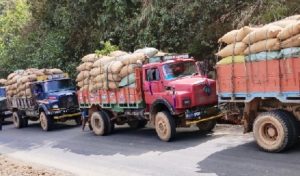A high-level probe has been launched in India into the smuggling of areca nuts from the neighboring countries. Also known as betel nuts, they are widely chewed across South Asia, despite the harmful health effects. The illegal areca nut trade is alleged to be thriving thanks to the patronage of politicians and government officials across many states in the country.
The Central Bureau of Investigation (CBI) has swung into action following an order from the Bombay High Court, which heard a Public Interest Litigation alleging that substandard and unsafe areca nuts were being smuggled by traders in connivance with custom officials.
Most of these consignments are believed to be of Indonesian origin, smuggled through the India-Myanmar and India-Bangladesh borders. In the last five years, trucks filled with the nuts have been confiscated at several locations in the country, including the border states of Assam and Manipur in the frontier zone of the northeast.
In 2016, as many as 23 wagons of areca nuts were seized by the railways in Maharastra, which were reportedly loaded at a station in the eastern region of the country. Three years later, a First Information Report at a police station in Assam alleged that 200 trucks of areca nuts sourced from Myanmar pass through the state every day without paying import duties.
“Different mechanisms are in vogue along the entry points on the borders with Myanmar and Bangladesh that involve the use of fake documents and manipulation of figures to sustain the illicit trade,” said a government official who did not wish to be named.
The CBI has already registered a case naming unknown officials of Central Excise and Customs and private individuals who are believed to be actively involved in the racket, estimated to cause a loss of 150 billion rupees ($2 billion) to the government exchequer annually.
The smuggling is facilitated by the trade agreements among the countries in South Asia. A section of traders and government officials take advantage of the deals by falsely declaring areca nuts from Indonesia as originating from India’s neighbors. Fake certificates of origin and undervalued invoices are produced by the traders to take advantage of the concessional rates that apply to commodities produced by the member countries of the South Asian Association for Regional Cooperation.
“Trucks laden with supari (areca nut) were seen on the highway at regular intervals, but they were always in possession of the necessary documents. It was not possible for the police to prove that they [the documents] were fake,” said a former police official who was posted at a border district of Assam two years ago.
Of all the states in India, the smuggling of areca nuts has generated the most controversy in Assam, where the racket is alleged to have the blessings of powerful politicians and government officials. Opposition parties and activists have found it a convenient tool to attack the BJP-led government for its inability to put an end to the trade, which is among the many unlawful syndicates specializing in different commodities that flourish in the border state.
However, unlike areca nuts, which are imported, most of these syndicates in India’s Northeast thrive on exporting commodities such as cattle, coal, and boulders to Bangladesh, after sourcing these goods from different destinations in the country.
In 2018, Assam rights activist Akhil Gogoi revealed details of the clandestine network that sustains the smuggling of areca nut from Myanmar. Briefing the media, he disclosed that the trade was being controlled from Golaghat and Barak Valley in the state by kingpins who ensure the regular supply of the commodity to distant markets at Gujarat and Maharashtra from the country’s borders.

































